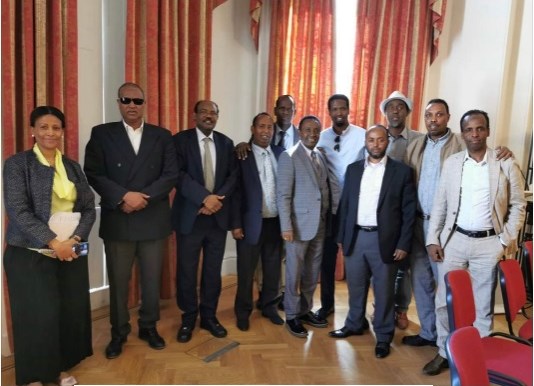Somali state government advisor accused the Ethiopian embassy in London of using “colonial tactics” to divide Somali diaspora by clan.
Mohammed Olad, the new communications advisor for Somali President Mustafa Omer, condemned the embassy’s recent meeting with members of the Gadabursi Somali clan in London as a plot “bitting Somalis against each other.”
The Ethiopian embassy in UK faced similar criticism from other Somali nationalists on social media who accused the embassy of “an immoral act” by discussing with Somali sub-clans like Gadabuursi, separately.
Wardi Abdulatif, another supporter of the current Somali President Mustefa said the embassy should use the phrase “Somali region diaspora” instead of mentioning different clan or sub-clan names of the diaspora.
However, members of the Dir clan Gadabursi sub-clan and other non-Darood Somali clans praised the Ethiopian embassy for holding dialogue with exiled Somali-Ethiopians in London and beyond. Hasan Ahmed, a resident of Jigjiga, said other clans do not need the permission of Darood clan to meet with their ambassadors. Other Somalis ridiculed the alleged hypocrisy of accusing the Gadabursi clan for organizing, while the Ogaden clan has organized under the ONLF and used the label “Ogadenia” for over 30 years.
Meanwhile, Ethiopians on social media criticized the “double standard” of Somali nationalists who support dividing Ethiopia by ethnic identity but oppose when Somalis are labeled by their sub-clan identity.
“Finally you can feel the pain of Ethiopian nationalists when you divide us by ethnicity, just like you accuse the embassy of dividing you by clan,” posted one resident of Adama in Oromia.
Critics say these controversial debates illustrate the “hypocrisy” of the current identity based federalism in Ethiopia, because ethnic nationalists are openly denying the “group rights” of clans and sub-clans (ex. Somalis), or dialects (ex. Meskan of Gurage), indigenous minority (ex. Qimant, Harari ) as well as by religion (Wolega) and by region (Welkait, Wollo etc). Ethnic nationalists have also recently opposed the group rights of mixed urban Ethiopians living in cities like Addis Ababa, Hawassa and Nazret who want to separate from larger ethnic blocs like Oromia and Sidama.
All these identity based disputes combined with dangerous nativism and violent land disputes nationwide, have virtually overwhelmed the current system of ethnic federalism in Ethiopia. Since 2018, International rights groups have ranked Ethiopia as the worst ethnic based humanitarian crisis in the world under Prime Minister Abiy Ahmed.
Some diaspora members of the Gadabursi clan have already demanded that Somali President Mustafa apologize for the “reckless” comments of his advisor on social media this week. This friction between Somali clans resembles historical disputes between Oromo clans like Arsi, Shewa, Walaga and others, including among splinter factions of the Oromo Liberation Front (OLF) who sued each other in American courts. Since the arrival of the OLF rebels in Ethiopia, various wings of the group have split from the leadership of Dawud Ibsa, causing multiple bank robberies in western Oromia. Even Oromo Prime Minister Abiy Ahmed has publicly admitted this division by acknowledging that he fears for his safety if he travels to western Oromia.
Meanwhile, supporters of the largest Ethiopian opposition party of Dr. Berhanu Nega say non-identity based true federalism is the solution to end the current tribal competition and conflicts nationwide. They attribute the lack of respect for the individual rights of the citizen and the dangerous institutionalization of identity politics as the fundamental cause of the crisis in Ethiopia.
Satenew






































